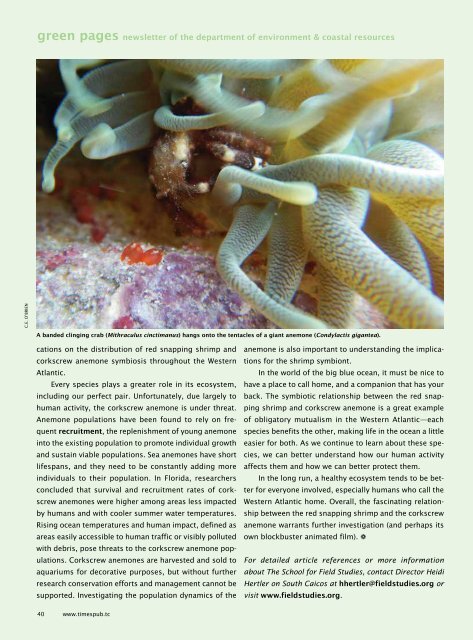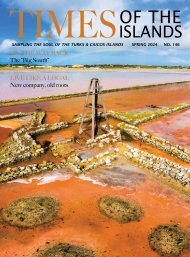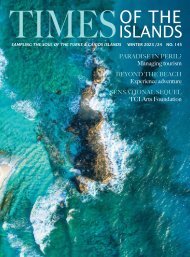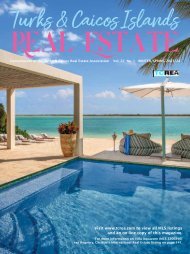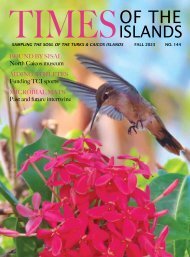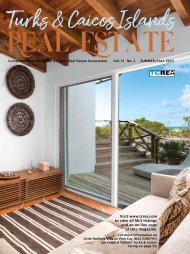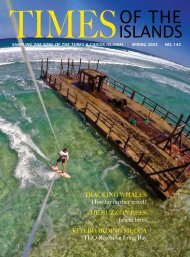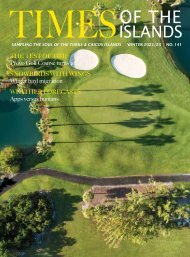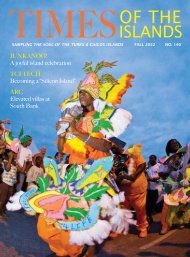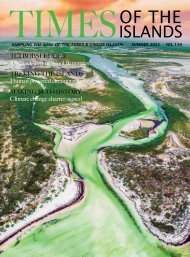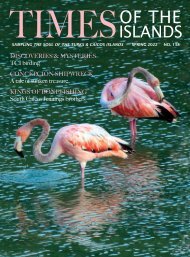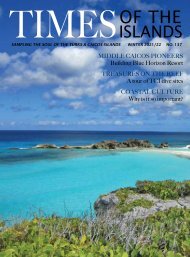Times of the Islands Summer 2023
Presents the "soul of the Turks & Caicos Islands" with in-depth features about local people, culture, history, environment, real estate, businesses, resorts, restaurants and activities.
Presents the "soul of the Turks & Caicos Islands" with in-depth features about local people, culture, history, environment, real estate, businesses, resorts, restaurants and activities.
Create successful ePaper yourself
Turn your PDF publications into a flip-book with our unique Google optimized e-Paper software.
green pages newsletter <strong>of</strong> <strong>the</strong> department <strong>of</strong> environment & coastal resources<br />
C.E. O’BRIEN<br />
A banded clinging crab (Mithraculus cinctimanus) hangs onto <strong>the</strong> tentacles <strong>of</strong> a giant anemone (Condylactis gigantea).<br />
cations on <strong>the</strong> distribution <strong>of</strong> red snapping shrimp and<br />
corkscrew anemone symbiosis throughout <strong>the</strong> Western<br />
Atlantic.<br />
Every species plays a greater role in its ecosystem,<br />
including our perfect pair. Unfortunately, due largely to<br />
human activity, <strong>the</strong> corkscrew anemone is under threat.<br />
Anemone populations have been found to rely on frequent<br />
recruitment, <strong>the</strong> replenishment <strong>of</strong> young anemone<br />
into <strong>the</strong> existing population to promote individual growth<br />
and sustain viable populations. Sea anemones have short<br />
lifespans, and <strong>the</strong>y need to be constantly adding more<br />
individuals to <strong>the</strong>ir population. In Florida, researchers<br />
concluded that survival and recruitment rates <strong>of</strong> corkscrew<br />
anemones were higher among areas less impacted<br />
by humans and with cooler summer water temperatures.<br />
Rising ocean temperatures and human impact, defined as<br />
areas easily accessible to human traffic or visibly polluted<br />
with debris, pose threats to <strong>the</strong> corkscrew anemone populations.<br />
Corkscrew anemones are harvested and sold to<br />
aquariums for decorative purposes, but without fur<strong>the</strong>r<br />
research conservation efforts and management cannot be<br />
supported. Investigating <strong>the</strong> population dynamics <strong>of</strong> <strong>the</strong><br />
anemone is also important to understanding <strong>the</strong> implications<br />
for <strong>the</strong> shrimp symbiont.<br />
In <strong>the</strong> world <strong>of</strong> <strong>the</strong> big blue ocean, it must be nice to<br />
have a place to call home, and a companion that has your<br />
back. The symbiotic relationship between <strong>the</strong> red snapping<br />
shrimp and corkscrew anemone is a great example<br />
<strong>of</strong> obligatory mutualism in <strong>the</strong> Western Atlantic—each<br />
species benefits <strong>the</strong> o<strong>the</strong>r, making life in <strong>the</strong> ocean a little<br />
easier for both. As we continue to learn about <strong>the</strong>se species,<br />
we can better understand how our human activity<br />
affects <strong>the</strong>m and how we can better protect <strong>the</strong>m.<br />
In <strong>the</strong> long run, a healthy ecosystem tends to be better<br />
for everyone involved, especially humans who call <strong>the</strong><br />
Western Atlantic home. Overall, <strong>the</strong> fascinating relationship<br />
between <strong>the</strong> red snapping shrimp and <strong>the</strong> corkscrew<br />
anemone warrants fur<strong>the</strong>r investigation (and perhaps its<br />
own blockbuster animated film). a<br />
For detailed article references or more information<br />
about The School for Field Studies, contact Director Heidi<br />
Hertler on South Caicos at hhertler@fieldstudies.org or<br />
visit www.fieldstudies.org.<br />
40 www.timespub.tc


